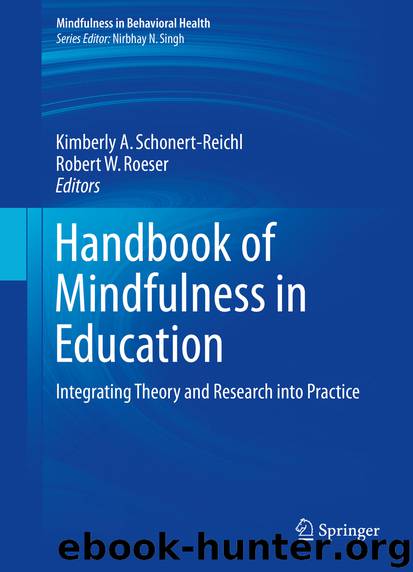Handbook of Mindfulness in Education by Kimberly A. Schonert-Reichl & Robert W. Roeser

Author:Kimberly A. Schonert-Reichl & Robert W. Roeser
Language: eng
Format: epub
Publisher: Springer New York, New York, NY
Mindfulness-Based Training for Human Service Professionals
In addition to the clinical studies investigating the health benefits of mindfulness training, there is growing interest in the integration of mindfulness-based training for human service professionals. Specifically, there is interest in professional preparation programs such as counseling (Schure, Christopher, & Christopher, 2008; Shapiro, Brown, & Biegel, 2007), nursing (Cohen-Katz et al., 2005), social work (Ying, 2009), dentistry (Lovas, Lovas, & Lovas, 2008), and medicine (Saunders et al., 2007; Shapiro, Astin, Bishop, & Cordova, 2005). Complementing the stress reduction benefits, those studies reveal the professional value of mindfulness training, such as the development of presence in the practitioner. Within such studies, the ability to attend fully to and connect with the client is what Siegel (2007) refers to as attunement, which is essential in the process of developing a therapeutic relationship. The patient’s healing is thus directly responsive to the cultivation of therapists’ disposition of mindfulness.
Such findings are certainly relevant to the teaching profession, if for no other reason, because teachers’ effectiveness is so clearly dependent upon their ability to connect and develop healthy relationships with their students (Hamre & Pianta, 2001; Jennings & Greenberg, 2009; Zins, Weissberg, Wang, & Walberg, 2004). Many Teacher Education programs highlight the importance of classroom climate and teacher-student relationships, often covering a descriptive analysis and approach to these topics. However, few programs provide specific opportunities for developing the competencies that create healthy teacher-student relationships (LeBlanc & Gallavan, 2009; Riley, 2011; Schwartz, 2008). Drawing on existing literature, we can expect mindfulness to enhance teacher presence and in turn positive teacher-student relationships. The current study seeks to uncover additional benefits of mindfulness training in Teacher Education. The next section introduces, MBWE, the program used in this study.
Download
This site does not store any files on its server. We only index and link to content provided by other sites. Please contact the content providers to delete copyright contents if any and email us, we'll remove relevant links or contents immediately.
The Art of Coaching Workbook by Elena Aguilar(51165)
Trainspotting by Irvine Welsh(21643)
Twilight of the Idols With the Antichrist and Ecce Homo by Friedrich Nietzsche(18624)
Fangirl by Rainbow Rowell(9229)
Periodization Training for Sports by Tudor Bompa(8254)
Change Your Questions, Change Your Life by Marilee Adams(7760)
This Is How You Lose Her by Junot Diaz(6877)
Asking the Right Questions: A Guide to Critical Thinking by M. Neil Browne & Stuart M. Keeley(5759)
Grit by Angela Duckworth(5605)
Red Sparrow by Jason Matthews(5467)
Paper Towns by Green John(5179)
Room 212 by Kate Stewart(5105)
Ken Follett - World without end by Ken Follett(4723)
Housekeeping by Marilynne Robinson(4436)
The Sports Rules Book by Human Kinetics(4379)
Papillon (English) by Henri Charrière(4263)
Double Down (Diary of a Wimpy Kid Book 11) by Jeff Kinney(4261)
The Motorcycle Diaries by Ernesto Che Guevara(4089)
Exercise Technique Manual for Resistance Training by National Strength & Conditioning Association(4063)
